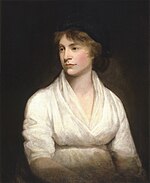Mary Wollstonecraft
 Mary Wollstonecraft ( , ; 27 April 175910 September 1797) was an English writer and philosopher best known for her advocacy of women's rights. Until the late 20th century, Wollstonecraft's life, which encompassed several unconventional (at the time) personal relationships, received more attention than her writing. Wollstonecraft is regarded as one of the founding feminist philosophers, and feminists often cite both her life and her works as important influences.
Mary Wollstonecraft ( , ; 27 April 175910 September 1797) was an English writer and philosopher best known for her advocacy of women's rights. Until the late 20th century, Wollstonecraft's life, which encompassed several unconventional (at the time) personal relationships, received more attention than her writing. Wollstonecraft is regarded as one of the founding feminist philosophers, and feminists often cite both her life and her works as important influences.During her brief career she wrote novels, treatises, a travel narrative, a history of the French Revolution, a conduct book, and a children's book. Wollstonecraft is best known for ''A Vindication of the Rights of Woman'' (1792), in which she argues that women are not naturally inferior to men but appeared to be only because they lack education. She suggests that both men and women should be treated as rational beings and imagines a social order founded on reason.
After two ill-fated affairs, with Henry Fuseli and Gilbert Imlay (by whom she had a daughter, Fanny Imlay), Wollstonecraft married the philosopher William Godwin, one of the forefathers of the anarchist movement. Wollstonecraft died at the age of 38 leaving behind several unfinished manuscripts. She died 11 days after giving birth to her second daughter, Mary Shelley, who became an accomplished writer and the author of ''Frankenstein''.
Wollstonecraft's widower published a ''Memoir'' (1798) of her life, revealing her unorthodox lifestyle, which inadvertently destroyed her reputation for almost a century. However, with the emergence of the feminist movement at the turn of the twentieth century, Wollstonecraft's advocacy of women's equality and critiques of conventional femininity became increasingly important. Provided by Wikipedia